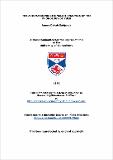An axiomatic functionalist analysis of the phonology of Yulu
Abstract
This thesis is concerned with the description of Yulu, a language
which has not previously been subjected to modern linguistic analysis.
Thus this thesis has two important aspects. Firstly, however remote a
Language, its description adds a valuable contribution to linguistic
knowledge. Secondly, its description tests the validity of linguistic
theories in general and the theory used in this work in particular; as
a linguist should not only be able to describe one universal but any
number of parallel universes of speech-phenomena, namely different
languages or dialects or even idiolects. Since the theory has been instrumental
in describing the phonological system of Yulu in a consistent
and adequate manner, it has once again proved its usefulness as a 'general' linguistic
theory. The theory applied is that of Professor J. W. F. Mulder and is a sub-component of his 'Axiomatic Functionalist Linguistics'.
This thesis is divided into three parts. Part I, dealing with the
theoretical background, comprises twelve chapters, of which the first
four provide an introduction to the basic principles of axiomatic
functionalism. The remaining eight chapters introduce the theoretical
notions of phonological theory and analysis as practised by axiomatic
functionalists. Chapter I deals with the axiomatic functionalist principle
of maintaining a strict distinction between the linguistic theory,
linguistic descriptions, and the speech-phenomena and also with the basic
criteria for evaluating both the linguistic theory and linguistic
descriptions. Chapter II, dealing with the 'hypothetico-deductive Method',
explains the philosophical principles underlying the axiomatic functionalist
approach, Chapter III deals with 'The origin and scope of the theory'.
Chapter IV explains the definition of 'language' as "a semiotic system
with a 'double articulation'" (Mulder 1968). Chapter V covers 'The domain
of phonology'; Chapter VI 'The notion "phoneme" as defined in axiomatic
functionalism'; Chapter VIII 'The "abstract" approach to phonology';
Chapter VIII is concerned with 'Identity and distinctive function of
a phoneme'; Chapter IX with 'Phonematics'; Chapter X with 'Neutralization'
and 'archiphoneme'; Chapter XI with 'phonemes and their realizations
(allophony)'; and Chapter XII with 'Phonotactics’.
Part II, consists of one basic chapter, and is intended to give
general background information about Yulu - the language whose phonological
analysis we are concerned with in this thesis.
Part III, dealing with the actual phonological analysis consists of
five chapters. Chapter I deals with 'The phonemes of Yulu and their
realizations'; Chapter II 'Neutralization' and 'Concord'; Chapter III
'Classificatory calculus in Yulu'; Chapter IV 'Phonotactic distribution
in Yulu'; and Chapter V 'The tones of Yulu'.
Type
Thesis, PhD Doctor of Philosophy
Collections
Items in the St Andrews Research Repository are protected by copyright, with all rights reserved, unless otherwise indicated.

